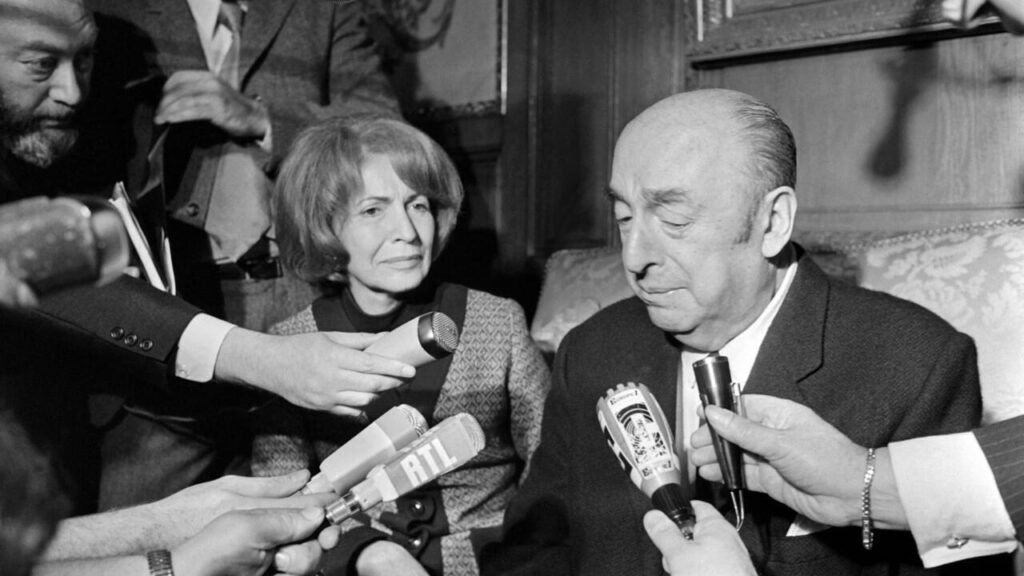Read morePrix Goncourt: Kamel Daoud wins France’s literary prize for Algerian Civil War novel ‘Houris’
From poet to rescuer
Pablo Neruda was deeply affected by the Spanish Civil War (1936 to 1939), a brutal conflict between the Republican government and Francisco Franco’s Nationalist forces that led to the Franco dictatorship. This pivotal struggle became a central focus of Neruda’s political and literary efforts.
In Paris, he collaborated with British writer Nancy Cunard to co-found the literary review “Les Poètes du Monde Défendent le Peuple Espagnol” (Poets of the World Defend the Spanish People). Proceeds from the publication funded humanitarian aid for those suffering under Franco’s regime, exemplifying Neruda’s conviction that poetry and politics could unite to serve justice and humanity.
In 1939, Neruda’s commitment took a historic turn as nearly 500,000 Spanish Republicans, including soldiers and civilians, crossed the French border following the fall of Catalonia. With France ill-prepared for such a large influx, the refugees found themselves in dire conditions, many being forced into internment camps.
As Chile’s consul for Spanish immigration, Neruda spearheaded a bold rescue mission, arranging the voyage of over 2,000 Spanish Republicans to Chile aboard a ship named “Winnipeg”. He later described this effort as both “the noblest mission (he had) ever undertaken” and his “most beautiful poem”.
French exit
Neruda’s ties with France deepened during his exile. In 1948, Chile’s right-wing government, led by President Gabriel González Videla, accused him of subversion due to his Communist affiliations. Forced to flee, Neruda embarked on a harrowing but poetic journey through the Andes to Argentina and ultimately to France.
In Paris, he re-emerged as a symbol of resistance. Neruda’s arrival at the World Congress of Peace Forces caused a stir when he appeared unprompted, book in hand, to read one of his poems.
“Many thought I was dead,” he later wrote in his memoirs. “They couldn’t imagine how I had dodged the relentless persecution of Chilean police.”
The Chilean authorities quickly denied his escape, claiming there was no way that Neruda had left the country. The poet was undeterred.
“Say that I am not Pablo Neruda, but another Chilean who writes poetry, fights for freedom, and is also called Pablo Neruda,” he quipped to the French press.
During his exile, Neruda was embraced by the international community. Figures like Pablo Picasso and Louis Aragon provided him with protection and assistance, helping him navigate the complexities of French bureaucracy.
A lasting – if troubled – legacy
By 1952, political tides in Chile shifted, allowing Neruda to return home. However, his ties to France endured. From 1970 to 1973, he served as Chile’s ambassador to France under President Salvador Allende, further cementing the bond with the country that had offered him refuge during his years of exile.
In his Nobel Prize acceptance speech in 1971, Neruda seized the opportunity to celebrate French culture once again, quoting Rimbaud: “Only with a burning patience can we conquer the splendid City which will give light, justice, and dignity to all mankind.”
Read moreHan Kang wins South Korea’s first Nobel Prize in Literature
His legacy remains deeply embedded in French culture. Dozens of schools and public institutions across France bear his name, and his works are integral to the study of Spanish and poetry in classrooms. The Chilean Embassy in Paris features a commemorative plaque honouring Neruda’s time there.
A plaque commemorates Pablo Neruda’s time at the Chilean Embassy in Paris. © Wikimedia Commons
“Neruda embodies a vision of benevolence, education, and culture for all,” the University of Nanterre’s Decante said. “His political influence and democratic engagement resonate through the years and will continue to do so.”
In Chile, however, the powerful Chilean feminist movement is challenging the poet’s stature. In 2018, activists denounced plans to rename Santiago airport after his name. At stake, a passage from his posthumous memoirs published in which he confesses to having raped a maid in Sri Lanka in 1929, when he was Chilean consul.
“The encounter was that of a man with a statue. She was right to despise me. The experience never happened again,” he writes. The novelist and feminist activist Isabel Allende tried to set the record straight when the controversy erupted: “Like many young feminists in Chile I am disgusted by some aspects of Neruda’s life and personality. However, we cannot dismiss his writing.”
This article was modified on 21/11 to include a reference to the controversy surrounding Pablo Neruda’s legacy.
Source link : http://www.bing.com/news/apiclick.aspx?ref=FexRss&aid=&tid=673fc2b9d6b147f98ea75c606e090bc5&url=https%3A%2F%2Fwww.france24.com%2Fen%2Feurope%2F20241120-why-pablo-neruda-legacy-continues-to-thrive-in-france&c=17512920091487021160&mkt=de-de
Author :
Publish date : 2024-11-21 06:01:00
Copyright for syndicated content belongs to the linked Source.
